| Listing 1 - 10 of 14 | << page >> |
Sort by
|
Book
ISBN: 0131979965 9780131979963 Year: 1971 Publisher: Englewood Cliffs (N.J.): Prentice Hall,
Abstract | Keywords | Export | Availability | Bookmark
 Loading...
Loading...Choose an application
- Reference Manager
- EndNote
- RefWorks (Direct export to RefWorks)
Economic conditions. Economic development --- Supply and demand --- Microeconomics --- Demand and supply --- Industrial production --- Law of supply and demand --- Economics --- Competition --- Exchange --- Overproduction --- Prices --- Value --- Price theory
Book
ISBN: 2130363105 9782130363101 Year: 1980 Publisher: Paris: PUF,
Abstract | Keywords | Export | Availability | Bookmark
 Loading...
Loading...Choose an application
- Reference Manager
- EndNote
- RefWorks (Direct export to RefWorks)
Pour que la modernité soit, il a fallu que l'économie fût ; fût découverte. L'homme moderne n'a inventé ni la technique, ni la rationalité, ni même la science, quelles que puissent être ses illusions à ce sujet. Mais il a bel et bien découvert l'économie. Pour placer dans sa mouvance active la totalité du réel, lui-même y compris. L'économie, première servie... Partant de ce lieu stratégique de notre modernité, Georges-Hubert de Radkowski nous fait arpenter toutes les contrées privilégiées par notre société, nous introduit dans toutes ses demeures. Guidés par lui, nous mettons à nu l'imposture anthropologique qui rend solidaires économie et production de richesses ; nous saisissons dans leurs dimensions véritables la place et la signification de la technique, nous cernons le contour secret et méconnu de son être. Chemin faisant, apparaissent à nos yeux l'espace où se déploie l'ouvre d'art, le rôle caché du travail dans la vision de notre temps, l'inconsistance de la notion occidentale du progrès technique, le caractère fantasmagorique de cette entité « à tout faire » de l'économie politique, le besoin. Cette interrogation sur l'économique, approche radicale de ses assises, nous met à l'écoute de cette puissance « poétique » et abyssale d'où proviennent l'humanité de l'homme autant que toute l'histoire de la société humaine : celle du DÉSIR. Ce texte où travaille le désir inaugure une critique de l'économie, équivalent contemporain de la rupture apportée par Georges Bataille dans La Part maudite et La Notion de dépense.
Methodology of economics --- Economics --- Supply and demand --- Desire --- Economie politique --- Offre et demande --- Désir --- Psychological aspects --- Social aspects --- Aspect psychologique --- Aspect social --- 338 <09> --- -Supply and demand --- Demand and supply --- Industrial production --- Law of supply and demand --- Competition --- Exchange --- Overproduction --- Prices --- Value --- Economic theory --- Political economy --- Social sciences --- Economic man --- Economische geschiedenis --- Supply and demand. --- Psychological aspects. --- 338 <09> Economische geschiedenis --- Désir --- Sociological aspects. --- Behavioral economics --- Behavioural economics --- Economics - Psychological aspects
Book
ISBN: 015571077X 9780155710771 Year: 1971 Publisher: New York: Harcourt Brace Jovanovich,
Abstract | Keywords | Export | Availability | Bookmark
 Loading...
Loading...Choose an application
- Reference Manager
- EndNote
- RefWorks (Direct export to RefWorks)
Economics --- Consumption (Economics) --- Utility theory --- Supply and demand. --- 330.1 --- Supply and demand --- Demand (Economic theory) --- Value --- Revealed preference theory --- Demand and supply --- Industrial production --- Law of supply and demand --- Competition --- Exchange --- Overproduction --- Prices --- Consumer demand --- Consumer spending --- Consumerism --- Spending, Consumer --- Economische grondbegrippen. Algemene begrippen in de economie --- 330.1 Economische grondbegrippen. Algemene begrippen in de economie --- Utility theory. --- Economics, Mathematical. --- Consommation. --- Utilité (économie politique) --- Offre et demande. --- Mathématiques économiques. --- Utilité (économie politique) --- Mathématiques économiques
Book
ISBN: 2040091394 9782040091392 Year: 1974 Volume: vol n! 1 Publisher: Paris: Dunod,
Abstract | Keywords | Export | Availability | Bookmark
 Loading...
Loading...Choose an application
- Reference Manager
- EndNote
- RefWorks (Direct export to RefWorks)
Money --- Macroeconomics --- Supply and demand --- Demand for money --- Mathematical models --- theorie monetaire --- creation monetaire --- AA / International- internationaal --- 333.401 --- 333.403 --- monetaire theorie --- geldschepping --- Begrip en functies van het geld. --- Monetaire theorieën. Kwantitatieve theorie. Theorie van de incasso's. Optiek van de uitgaven en inkomens. --- Demand and supply --- Industrial production --- Law of supply and demand --- Economics --- Competition --- Exchange --- Overproduction --- Prices --- Value --- Currency --- Monetary question --- Money, Primitive --- Specie --- Standard of value --- Finance --- Banks and banking --- Coinage --- Currency question --- Gold --- Silver --- Silver question --- Wealth --- Begrip en functies van het geld --- Monetaire theorieën. Kwantitatieve theorie. Theorie van de incasso's. Optiek van de uitgaven en inkomens --- Demand for money - Mathematical models

ISBN: 371860356X 9783718603565 Year: 1987 Volume: 15 Publisher: Chur: Harwood,
Abstract | Keywords | Export | Availability | Bookmark
 Loading...
Loading...Choose an application
- Reference Manager
- EndNote
- RefWorks (Direct export to RefWorks)
Trade theory --- Commercial policy --- Supply and demand --- Uncertainty --- International trade --- Mathematical models --- 339.54 --- -International trade --- -Supply and demand --- -Uncertainty --- -AA / International- internationaal --- 305.92 --- 382.10 --- Reasoning --- Demand and supply --- Industrial production --- Law of supply and demand --- Economics --- Competition --- Exchange --- Overproduction --- Prices --- Value --- External trade --- Foreign commerce --- Foreign trade --- Global commerce --- Global trade --- Trade, International --- World trade --- Commerce --- International economic relations --- Non-traded goods --- Foreign trade policy --- International trade policy --- Trade policy --- Economic policy --- Buitenlandse economische politiek. Buitenlandse handelspolitiek. Instrumentarium van de buitenlandse handel --- Econometrie van de internationale handel. Handelsbalans, betalingsbalans. Wissel. --- Theorieën van internationale en interregionale handel: algemeenheden. Comparatieve voordelen. --- Government policy --- Mathematical models. --- 339.54 Buitenlandse economische politiek. Buitenlandse handelspolitiek. Instrumentarium van de buitenlandse handel --- AA / International- internationaal --- Econometrie van de internationale handel. Handelsbalans, betalingsbalans. Wissel --- Theorieën van internationale en interregionale handel: algemeenheden. Comparatieve voordelen --- Commercial policy - Mathematical models --- Supply and demand - Mathematical models --- Uncertainty - Mathematical models --- International trade - Mathematical models
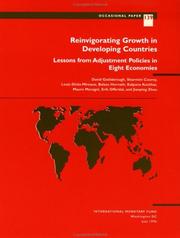
ISBN: 1557755590 1462357261 1452739897 9781557755599 Year: 1996 Volume: 139 Publisher: Washington (D.C.): International monetary fund,
Abstract | Keywords | Export | Availability | Bookmark
 Loading...
Loading...Choose an application
- Reference Manager
- EndNote
- RefWorks (Direct export to RefWorks)
This study examines the links between adjustment policies and growth in a small group of developing countries- Bangladesh, Chile, Ghana, India, Mexico, Morocco, Senegal, and Thailand - during 1970 -93. It provides an overview of the adjustment and growth experience, examines in depth several policy issues of particular interest, and distills the principal policy lessons for the design of adjustment policies.
Economics --- Economic development --- Structural adjustment (Economic policy) --- Developing countries --- Economic policy --- Case studies --- -Structural adjustment (Economic policy) --- -Developing Countries --- 330.35 (1-772) --- croissance economique --- pays en voie de developpement --- politique economique --- LDC / Developping Countries - Pays En Développement --- 338.340 --- 338.8 --- 331.33 --- 330.05 --- 338.90091724 --- Development, Economic --- Economic growth --- Growth, Economic --- Statics and dynamics (Social sciences) --- Development economics --- Resource curse --- -Case studies. --- Economische groei. Kwantitatieve toename. Technische vooruitgang --zie ook {338.09}--Onontwikkelde, onderontwikkelde gebieden --- economische groei --- ontwikkelingslanden --- economisch beleid --- Algemene ontwikkeling in de Derde Wereld. --- Economische groei. --- Structureel beleid. Reglementering. Dereglementering. Ordnungspolitik. --- Working papers --- Case studies. --- 330.35 (1-772) Economische groei. Kwantitatieve toename. Technische vooruitgang --zie ook {338.09}--Onontwikkelde, onderontwikkelde gebieden --- Structureel beleid. Reglementering. Dereglementering. Ordnungspolitik --- Algemene ontwikkeling in de Derde Wereld --- Economische groei --- Emerging nations --- Fourth World --- Global South --- LDC's --- Least developed countries --- Less developed countries --- Newly industrialized countries --- Newly industrializing countries --- NICs (Newly industrialized countries) --- Third World --- Underdeveloped areas --- Underdeveloped countries --- Economic development - Case studies --- Structural adjustment (Economic policy) - Developing countries --- Developing countries - Economic policy - Case studies --- Exports and Imports --- Investments: General --- Labor --- Macroeconomics --- Public Finance --- Investment --- Capital --- Intangible Capital --- Capacity --- Fiscal Policy --- Demand and Supply of Labor: General --- National Government Expenditures and Related Policies: Infrastructures --- Other Public Investment and Capital Stock --- Wages, Compensation, and Labor Costs: General --- Trade: General --- Labour --- income economics --- Public finance & taxation --- International economics --- Currency --- Foreign exchange --- Private investment --- Labor markets --- Structural reforms --- Tariffs --- Real wages --- National accounts --- Macrostructural analysis --- Taxes --- Saving and investment --- Fiscal policy --- Labor market --- Exports --- Chile --- Income economics
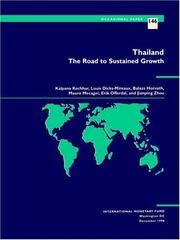
ISBN: 1557756031 1455242802 1452708614 9781557756039 Year: 1996 Volume: 146 Publisher: Washington (D.C.): International monetary fund,
Abstract | Keywords | Export | Availability | Bookmark
 Loading...
Loading...Choose an application
- Reference Manager
- EndNote
- RefWorks (Direct export to RefWorks)
Since the mid-1960s, Thailand's growth performance has been exceptional. Although hard hit by the external shocks fo the late 1970s and the early 1980s that proved severely destabilizing to many developing countries, Thailand showed remarkable reslience: price stability was quickly restored, and the Thai economy emerged from this period with strong recovery in growth and investment, in an environment of overall macroeconomic stability. This study examines the evolution of investment and growth and Thailand's macroeconomic and structural policies, with a view to understanding the main factors that have led to this impressive economic performance.
Third World: economic development problems --- Thailand --- Structural adjustment (Economic policy) --- Economic conditions --- Economic policy --- -330.35 <593> --- developpement economique --- politique economique --- thailande --- ID / Indonesia - Indonesie --- TH / Thailand - Thailande --- 331.31 --- 331.30 --- 333.820 --- 330.05 --- 338.9593 --- Economische groei. Kwantitatieve toename. Technische vooruitgang --zie ook {338.09}--Thailand --- economische ontwikkeling --- economisch beleid --- thailand --- Economisch beleid. --- Economische toestand. --- Geldbeleid, bankbeleid en kredietbeleid: algemeenheden. --- Economic conditions. --- Economic policy. --- Working papers --- 330.35 <593> Economische groei. Kwantitatieve toename. Technische vooruitgang --zie ook {338.09}--Thailand --- 330.35 <593> --- Economische toestand --- Economisch beleid --- Geldbeleid, bankbeleid en kredietbeleid: algemeenheden --- Developing countries: economic development problems --- Structural adjustment (Economic policy) - Thailand --- Thailand - Economic conditions --- Thailand - Economic policy --- Investments: General --- Labor --- Macroeconomics --- Public Finance --- Production and Operations Management --- Wages, Compensation, and Labor Costs: General --- Investment --- Capital --- Intangible Capital --- Capacity --- Fiscal Policy --- Demand and Supply of Labor: General --- Debt --- Debt Management --- Sovereign Debt --- Labour --- income economics --- Public finance & taxation --- International economics --- Public ownership --- nationalization --- Private investment --- Real wages --- Fiscal policy --- Labor markets --- Labor costs --- National accounts --- Wages --- Public enterprises --- Economic sectors --- Saving and investment --- Labor market --- Industrial productivity --- Debts, Public --- Income economics --- Nationalization
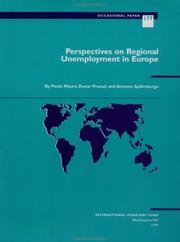
ISBN: 155775800X 1462335063 1452771170 9781557758002 Year: 1999 Volume: 177 Publisher: Washington (D.C.): International monetary fund,
Abstract | Keywords | Export | Availability | Bookmark
 Loading...
Loading...Choose an application
- Reference Manager
- EndNote
- RefWorks (Direct export to RefWorks)
The third stage of European Economic and Monetary Union (EMU) was implemented in January 1999 against the specter of persistently high unemployment in many of the participating countries. While the high European unemployment has received considerable attention, this new IMF staff study analyzes an equally important issue: the extent of regional unemployment disparities in certain countries. The paper focuses on large and persistent differences in regional unemployment rates within several European countries. The paper includes detailed case studies of two euro area countries where regional disparities in unemployment are striking- Italy and Spain. The studies emphasize that wages are unresponsive to local labor market conditions.
Labour market --- Europe --- Unemployment --- Regional disparities --- -Unemployment --- -331.56 <4> --- werkloosheid --- regionaal economisch beleid --- europa --- EEC / European Union - EU -Europese Unie - Union Européenne - UE --- US / United States of America - USA - Verenigde Staten - Etats Unis --- 305.94 --- 332.691 --- 306.13 --- 338.43 --- 307.21 --- 332.620 --- 330.05 --- 331.13794 --- Joblessness --- Employment (Economic theory) --- Full employment policies --- Labor supply --- Manpower policy --- Right to labor --- Underemployment --- Werkloosheid. Arbeidsreserve--Europa --- chomage --- politique economique regionale --- europe --- Econometrie van de arbeidsmarkt, de werkgelegenheid en de werkloosheid. --- Evolutie van de arbeidsmarkt. --- Indexcijfers van de werkgelegenheid en van de werkloosheid. --- Regionaal beleid. Industriële ontwikkeling en omschakeling van bepaalde regio's. Nieuwe industrieën. --- Statistieken van de werkgelegenheid en werkloosheid. --- Werkloosheid: algemeenheden. Philipscurve. --- Working papers --- Regional disparities. --- 331.56 <4> Werkloosheid. Arbeidsreserve--Europa --- 331.56 <4> --- Econometrie van de arbeidsmarkt, de werkgelegenheid en de werkloosheid --- Indexcijfers van de werkgelegenheid en van de werkloosheid --- Statistieken van de werkgelegenheid en werkloosheid --- Werkloosheid: algemeenheden. Philipscurve --- Evolutie van de arbeidsmarkt --- Regionaal beleid. Industriële ontwikkeling en omschakeling van bepaalde regio's. Nieuwe industrieën --- Unemployment - OECD countries - Regional disparities --- Unemployment - Europe - Regional disparities --- Labor --- Macroeconomics --- Unemployment: Models, Duration, Incidence, and Job Search --- Wages, Compensation, and Labor Costs: General --- Demand and Supply of Labor: General --- Employment --- Wages --- Intergenerational Income Distribution --- Aggregate Human Capital --- Aggregate Labor Productivity --- Labor Force and Employment, Size, and Structure --- Labour --- income economics --- Unemployment rate --- Labor markets --- Labor market --- Economic theory --- Labor costs --- Italy --- Income economics
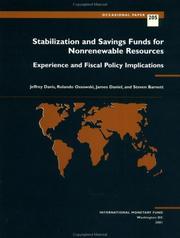
ISBN: 1589060199 1462319920 1452725772 9781589060197 Year: 2001 Volume: 205 Publisher: Washington (D.C.): International monetary fund,
Abstract | Keywords | Export | Availability | Bookmark
 Loading...
Loading...Choose an application
- Reference Manager
- EndNote
- RefWorks (Direct export to RefWorks)
This chapter examines whether funds can help countries pursue good macroeconomic, and especially fiscal policies, and consequent design issues. Nonrenewable resource funds (NRF) have been suggested as a way of dealing with the effects of price variability, making it easier to put revenues aside when prices are high so that they can be made available to maintain expenditures when prices are low. Funds may also serve as mechanisms to allow part of the nonrenewable resource wealth to be shared by future generations. A detailed evaluation of country experience suggests that NRFs have been associated with a variety of operating rules and fiscal policy experience. In several cases, rules have been bypassed or changed and they do not themselves seem to have effectively constrained spending, and the integration of the fund's operations with overall fiscal policy has often proven problematic. Whether the political economy arguments for an NRF outweigh the potential disadvantages will need to be considered based on the situation in each country.
Money. Monetary policy --- Public finance --- Appropriations and expenditures --- Finance, Public --- Sustainable development --- Nonrenewable natural resources --- Fiscal policy --- Finance --- -Fiscal policy --- beleid --- natuurlijke rijkdommen --- 336.2 --- investissements --- developpement durable --- richesses naturelles --- politique fiscale --- AA* / International - Internationaal --- 338.013 --- 331.31 --- 336.61 --- 336.030 --- 330.05 --- 333.7 --- Development, Sustainable --- Ecologically sustainable development --- Economic development, Sustainable --- Economic sustainability --- ESD (Ecologically sustainable development) --- Smart growth --- Sustainable economic development --- Economic development --- Cameralistics --- Currency question --- Tax policy --- Taxation --- Economic policy --- Non-renewable natural resources --- Exhaustible resources --- Natural resources, Nonrenewable --- Natural resources --- Belastingsakkoorden. Belastingswezen --- investeringen --- duurzame ontwikkeling --- fiscaal beleid --- Belang, verdeling en beleid van de natuurlijke rijkdommen. Grondstoffen. --- Economisch beleid. --- Financieel beleid. --- Overheidsinkomsten. Belang, verdeling en evolutie. Begrotingsinkomsten: algemeenheden. --- Environmental aspects --- Government policy --- Economic aspects --- Working papers --- Fiscal policy. --- Sustainable development. --- Finance. --- Finance, Public. --- 336.2 Belastingen. Belastingswezen. Openbare financien. Belastingspolitiek. Belastingstheorie. Belastingsharmonisatie. Fiskale politiek. Belastingsleer. Belastingsdruk. Belastingstechniek. Belastingsstelsel.Belastingstarief --- 336.2 Belastingsakkoorden. Belastingswezen --- Belastingen. Belastingswezen. Openbare financien. Belastingspolitiek. Belastingstheorie. Belastingsharmonisatie. Fiskale politiek. Belastingsleer. Belastingsdruk. Belastingstechniek. Belastingsstelsel.Belastingstarief --- Economisch beleid --- Overheidsinkomsten. Belang, verdeling en evolutie. Begrotingsinkomsten: algemeenheden --- Financieel beleid --- Belang, verdeling en beleid van de natuurlijke rijkdommen. Grondstoffen --- Public finances --- Nonrenewable natural resources - Finance --- Budgeting --- Exports and Imports --- Macroeconomics --- Public Finance --- Natural Resources --- National Government Expenditures and Related Policies: General --- Fiscal Policy --- Nonrenewable Resources and Conservation: General --- National Budget --- Budget Systems --- Energy: Demand and Supply --- Prices --- Public finance & taxation --- Environmental management --- Budgeting & financial management --- International economics --- Expenditure --- Non-renewable resources --- Budget planning and preparation --- Oil prices --- Environment --- Public financial management (PFM) --- Expenditures, Public --- Budget --- Papua New Guinea
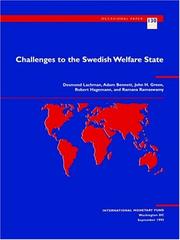
ISBN: 1557754861 1455228672 1452727783 9781557754868 Year: 1995 Volume: 130 Publisher: Washington (D.C.): International monetary fund,
Abstract | Keywords | Export | Availability | Bookmark
 Loading...
Loading...Choose an application
- Reference Manager
- EndNote
- RefWorks (Direct export to RefWorks)
Sweden's economy in the early 1990s has been characterized by a deep recession, high unemployment, a ballooning public sector budgete deficit, and a decline in the value of the currency- developments that have raised questions about the country's capacity to sustain its comprehensive welfare state. This study provides an analysis of recent economic developments in a longer-term context and assesses their implications for future policies.
Social security law --- Economic policy and planning (general) --- Sweden --- Public welfare --- Economic conditions --- Social policy --- -330.1 <485> --- politique sociale --- prosperite et bien etre --- situation economique --- suede --- SE / Sweden - Zweden - Suede --- 331.31 --- 331.30 --- 336.61 --- 336.024 --- 368.40 --- 331.32 --- 330.05 --- 361.6509485 --- Benevolent institutions --- Poor relief --- Public assistance --- Public charities --- Public relief --- Public welfare reform --- Relief (Aid) --- Social welfare --- Welfare (Public assistance) --- Welfare reform --- Human services --- Social service --- Economische grondbegrippen. Algemene begrippen in de economie--Zweden --- sociale politiek --- welvaart en welzijn --- economische toestand --- zweden --- Economisch beleid. --- Economische toestand. --- Financieel beleid. --- Sociale begroting, rekeningen en uitgaven. Gezondheid. --- Sociale voorzorg en verzekeringen. Sociale zekerheid: algemeenheden. --- Structuur van de economie. --- Government policy --- Economic conditions. --- Social policy. --- Working papers --- 330.1 <485> Economische grondbegrippen. Algemene begrippen in de economie--Zweden --- 330.1 <485> --- Economische toestand --- Economisch beleid --- Structuur van de economie --- Sociale begroting, rekeningen en uitgaven. Gezondheid --- Financieel beleid --- Sociale voorzorg en verzekeringen. Sociale zekerheid: algemeenheden --- Public welfare - Sweden --- Sweden - Economic conditions --- Sweden - Social policy --- Banks and Banking --- Exports and Imports --- Labor --- Macroeconomics --- Public Finance --- Budgeting --- Price Level --- Inflation --- Deflation --- Nonwage Labor Costs and Benefits --- Private Pensions --- Demand and Supply of Labor: General --- Trade: General --- Debt --- Debt Management --- Sovereign Debt --- Labour --- income economics --- Public finance & taxation --- Pensions --- International economics --- Labor markets --- Export prices --- Public debt --- Pension spending --- Prices --- Expenditure --- Exports --- Labor market --- Debts, Public --- Consumption --- Economics --- Income economics
| Listing 1 - 10 of 14 | << page >> |
Sort by
|

 Search
Search Feedback
Feedback About UniCat
About UniCat  Help
Help News
News